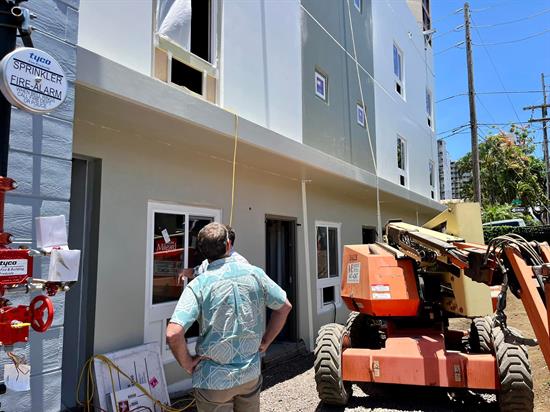As everyone in our Hawai‘i knows all too well, our state is consistently ranked as one of the most expensive in our country due to various factors. My focus has been on breaking down the overall high cost into these individual factors and then focusing on what our federal government can do to address each and all of these individual factors. These are a few of my actions on some of the major factors.
Shipping Costs / Jones Act
The high cost of living in Hawai‘i is deeply tied to the high cost of shipping as we must import almost all our goods from the continent. Shipping costs in Hawai‘i are artificially high due to a 100-year-old federal shipping law known as the Jones Act, which mandates that all cargo between U.S. ports be transported on U.S.-built, U.S.-owned and U.S.-crewed ships. This has created monopolistic conditions by effectively shutting out international competitors and allowing just two companies to dominate the market. As a result, transportation costs are inflated and passed down to consumers, raising the price of essential goods like food and housing materials.
This duopoly is especially problematic since Hawai‘i receives 90% of its goods by sea. The Jones Act adds nearly $1,800 a year to the average Hawai‘i family’s expenses and severely limits the state’s ability to develop affordable housing, support local industries like agriculture, or respond cost-effectively to emergencies.
To address this, I introduced three bills: the Noncontiguous Shipping Relief Act, which exempts noncontiguous regions (not part of the continent) from the Jones Act; the Noncontiguous Shipping Reasonable Rate Act, which caps domestic shipping rates to within 10% of international benchmarks; and the Noncontiguous Shipping Competition Act, which allows noncontiguous regions to invite non-Jones Act vessels to restore competition and reduce consumer costs, without impacting Jones Act protections for the contiguous 48 states. You can read more about these bills here.
I also introduced a bill that incentivizes U.S. companies to have their repair and maintenance done in allied countries, rather than exploit loopholes that allow major modifications to be done in the People’s Republic of China. In addition to the negative effects of sending U.S. dollars, jobs and technological investments directly into the hands of a strategic competitor, the continued outsourcing of vessel modification and construction undermines the U.S. shipbuilding and repair base, leaving us with fewer than 100 Jones Act-compliant vessels in active service nationwide, many of which are aging or specialized. This additional proposal would contribute to lower shipping costs. More on my proposal is available here.
Tariffs
The impact of the President’s tariffs has led to retaliatory tariffs that further exacerbates the problem of the cost of living. These actions are disrupting global supply chains, driving up costs and causing significant volatility in financial markets, all of which hurt American consumers and businesses.
Tariffs are essentially a tax on goods as they enter America. The burden of this tax is usually borne by domestic companies that import these goods, not by the foreign suppliers. This means that U.S. businesses will be faced with higher costs that will likely be passed on to consumers in the form of higher prices. While tariffs can have benefits, such as encouraging consumers to purchase domestically made goods, most economists agree that the financial burden will largely be felt by American consumers, not foreign exporters.
I have been outspoken about the unique harm tariffs cause Hawai‘i businesses and families. At a press conference hosted by the Congressional Asian Pacific American Caucus, I made clear that tariffs are not only raising costs on our small businesses and consumers but also straining our relationships with friends and allies in the Asia-Pacific where so many of our citizens have their ancestral origins. I called the administration’s actions a usurpation of Congressional power and underscored the need for Congress to reassert its constitutional role over trade. You can watch my remarks for yourself here.
I believe tariffs should be used more cautiously and in ways that protect, not harm, American families and industries, and I am committed to working with my colleagues in Congress to restore the necessary checks and balances over trade policy and undo the harm placed on everyday Americans.
In an effort to help reestablish the Congressional role in tariffs, I joined House colleagues in opposing the administration in court on its efforts to impose tariffs under the International Emergency Economic Powers Act. I also cosponsored:
- H.R. 2665, the Trade Review Act, which would reestablish limits on the President’s ability to impose unilateral tariffs without the approval of Congress.
- H.J. Res. 72 and H.J. Res 73, which would overturn the President’s national emergency declarations used to impose tariffs on Canada and Mexico.
- H.R. 2464, the Repealing Outdated and Unilateral Tariff Authorities Act, which would repeal Section 338 of the Tariff Act of 1930, an outdated Great Depression-era provision that gives the President unilateral authority to impose up to 50 percent tariffs in response to ill-defined “discriminatory behavior” by U.S. trading partners.
- H.R. 1548, the Leveling the Playing Field 2.0 Act, which would improve the U.S. trade remedy system and respond to repeat offenders and serial cheaters, leveling the playing field for American workers.
Energy Costs
Electricity costs are a major financial burden, especially for low-income households. Hawaii’s energy costs are high because we rely heavily on expensive, imported petroleum to generate electricity, and shipping costs for this fuel are significant due to our state’s isolation and the impacts of the Jones Act.
One answer to this challenge is to accelerate our state’s transition to affordable renewable energy. Through my membership on the exclusive House Appropriations Committee, responsible for all federal discretionary funding, I secured language modifying and extending a Department of Energy clean energy program that has been widely beneficial for Hawai‘i. The newly named Energy Technology Innovation Office, previously known as the Energy Transitions Initiative, supports island and remote communities by providing personalized technical and financial assistance. You can learn more about the bill here.
Although this program has helped so many across our great nation, it has never been formally codified, so I recently introduced legislation make to make this program permanent. Please click here for more details.
Moreover, as a member of the Sustainable Energy and Environment Coalition, a group of over 100 of my Democratic colleagues who are committed to advancing policies that support clean energy innovation, address climate change and protect our natural environment, I will continue to identify and support legislation to accelerate our state’s transition to affordable renewable energy and bring down energy costs.
Food Costs

Food costs in Hawai‘i are mostly higher than in other parts of the U.S. due to the cost of shipping and our unique challenges of growing enough food locally. To counter these factors, through my House Appropriations Committee and otherwise, I am working to protect and expand federal programs that help our state’s local farmers. This will help lower costs by avoiding high shipping costs, creating local jobs, enhancing food security and providing consumers with fresher food options.
For example, my Appropriations Committee’s Fiscal Year 2026 agricultural funding bill includes $5 million for Education Grants for Alaska Native and Native Hawaiian-Serving Institutions. This program addresses the educational needs of food and agricultural sciences-related disciplines and prepares low-income students for careers related to food, agricultural and natural resources.
I also voted against H.R. 1, the reconciliation budget bill that devastates the Supplemental Nutrition Assistance Program, Medicaid and other bedrock safety nets for those in the most need; provides huge tax breaks to those who least need it; increases our national debt by trillions of dollars; reverses decades of sound energy policy; hides various special interest giveaways; and otherwise is not consistent with sound policy and our basic values. Unfortunately, this bill has been signed into law. Here is my full statement about the bill and why I opposed it.
While the negative impacts of this bill, including higher food costs for large parts of our population, will not be fully realized until some provisions are implemented after 2026, I am already working to reverse these changes in Congress. I continue to coordinate with our state agencies and senior elected officials to assess specific impacts and identify steps that may blunt the negative impact of the bill on our state.
Housing Costs

The cost of housing in Hawai‘i is significantly higher than the national average, with median home values and rental costs consistently ranking among the highest in the United States. While much of this is tied to shipping costs and local and state housing policy given our limited land availability and high demand, the federal government can and should help.
As a member of the Appropriations Committee, I have consistently worked to increase funding for programs that can help lower the cost of housing. For example, in our FY 2026 Transportation-Housing and Urban Development Appropriations bill, I helped secure:
- $1 million for the City and County of Honolulu for its Waikiki Vista Project that would provide more affordable housing units for low-income families,
- $38.4 billion for Section 8 Tenant-Based Rental Assistance,
- $18.5 billion for project-based rental assistance,
- $22 million for the Native Hawaiian Housing Block Grant, and
- $28 million for the Native Hawaiian Housing Loan Guarantee Fund.
You can learn more about this bill and my efforts here.
In addition to securing funding through the appropriations process, I’ve also supported legislation that tackles housing affordability. As one example, I cosponsored the Interagency Council on Affordable Housing Act, which would improve coordination across federal agencies to streamline and strengthen affordable housing efforts. As another example, I supported the Housing Navigators Act, which would provide resources to help individuals and families more easily connect with affordable housing options, apply for rental assistance and navigate complex housing systems.
Health Care Costs
Hawai‘i is regularly recognized as one of the healthiest states in the nation, yet we also face unique challenges that make medical care expensive. Our state’s small size and isolation make it difficult to take full advantage of economies of scale, hinder our ability to recruit and retain enough medical providers, especially in certain specialties, and creates higher operational costs due to our state’s high cost of living. I am working to address these challenges in a variety of ways.
For example, I have cosponsored the following bills to address our ongoing medical provider shortage and inadequate federal reimbursement rates:
- The Resident Physician Shortage Reduction Act. This bill would increase the number of residency positions eligible for graduate medical education payments under Medicare for qualifying hospitals, including hospitals in rural areas and health professional shortage areas.
- The Ensuring Outpatient Quality for Rural States Act. This bill would apply a cost-of-living adjustment to the non-labor related portion for hospital outpatient department services furnished in Alaska and Hawai‘i under Medicare.
- The Medicare Patient Access and Practice Stabilization Act. This bill would overturn a 2.83% Medicare physician payment cut that is discouraging doctors from accepting Medicare patients.
I have also utilized my position on the House Appropriations Committee to secure funding for various health care workforce programs. For example, I advocated for and helped secure in our FY 2026 bills:
- $130 million for the National Health Service Corps, which supports more than 17,000 primary care medical, dental and behavioral health providers through scholarships and loan repayments.
- $55 million for the Scholarships for Disadvantaged Students Program which seeks to promote diversity among health professions and improve access to quality healthcare by awarding schools funding for scholarships to disadvantaged students.
- $47 million for Area Health Education Centers which help develop and enhance education and training networks to strengthen and grow our healthcare workforce.
- $25.4 million for the Centers of Excellence programs which supports underrepresented minority students and faculty by providing educational and training opportunities that focus on increasing racial and ethnic diversity among health professions and addressing minority health issues.
Child Care

Families living paycheck to paycheck need help dealing with high costs, and the Child Tax Credit (CTC) is one of our most powerful and proven solutions. It provides middle and working-class families with unprecedented economic security and lifts millions of children out of poverty.
This is why I cosponsored the American Family Act (H.R. 2763). It would:
- Increase the value of the CTC from the current level of $2,000 per child to $6,360 for newborns, $4,320 for children ages one through six, and $3,600 for children age six through 17;
- End the policy that reduces the value of the CTC for low-income families, ensuring that the families of 17 million low-income children left out of the CTC under current law will receive the same credit as families in the middle class;
- Provide for monthly delivery of the credit so families have access to the credit as bills arrive; and
- Index the CTC for inflation to preserve the value of the credit moving forward.
I also believe strongly in investing in childcare and early childhood education. That is why I voted for the American Rescue Plan (ARP), which allocated nearly $40 billion to address the childcare crisis caused by COVID-19. These funds helped childcare centers stay open or reopen, kept providers on payroll and ensured children had safe and healthy learning environments. The ARP also included a historic increase to the Child and Dependent Care Tax Credit to provide working families with the financial support they need to afford childcare expenses.
Veterans
The high cost of living hits our nation’s veterans particularly hard. Increasing costs for necessities like housing, food and transportation often outpacing their fixed incomes. This creates financial stress on those who have given so much to help our nation.
To help veterans deal with rising costs, I voted for the Veterans’ Compensation Cost-of-Living Adjustment Act of 2024, which became law. It raised the Department of Veterans Affairs (VA) benefit rates to match inflation. Specifically, the bill increased compensation for veterans with service-connected disabilities along with dependency and indemnity compensation for survivors of certain veterans.
Since the beginning of the 119th Congress in January of this year, I have continued to cosponsor legislation that directly impact key areas to improve the overall quality of care veterans, their families and caregivers receive. Some of the legislation I have cosponsored includes:
- H.R. 585, the Supporting Veteran Families in Need Act, which would permanently extend the authorization for the VA to provide financial assistance for supportive services for very low-income veteran families in permanent housing.
- H.R. 877, the Deliver for Veterans Act, which would authorize the VA’s Adaptive Vehicle Grant Program to cover shipping and transportation costs for an automobile to certain disabled veterans.
- H.R. 303, the Retired Pay Restoration Act, which would expand eligibility for concurrent receipt of both military retired pay and veterans' disability compensation.
Education/Student Loans
College education is far too expensive for too many. This is why I support expanding need-based scholarship programs and the Public Service Loan Forgiveness Program that provide debt forgiveness in return for public service in certain fields such as medical care in underserved areas.
During my time in Congress, I have also consistently supported efforts to simplify the student loan system to ensure that all students can find affordable repayment options that work best for them. For example, through the appropriations process, I supported increasing the maximum Pell Grant award to $7,395 and protecting the historic $900 increase secured in Fiscal Years 2022 and 2023.
I also fight to preserve programs that provide direct financial support and scholarships to students, helping families manage the cost of college. For example, the TRIO programs provide tutoring, mentoring, counseling and scholarships to low-income, first-generation students and individuals with disabilities. When the current administration proposed eliminating TRIO, I joined with several colleagues in sending a letter to Secretary of Education McMahon urging clear protections for these vital programs. I remain committed to ensuring that TRIO and similar programs continue to help Hawai‘i students and families keep college affordable.
Expanding Our Local Economy
Attacking our high costs of living is not just about the costs themselves; there a whole other half which is about strengthening our economy to provide better-paying jobs to be able to afford costs. The federal government has a role to help build up our local economy and expand the number of high paying jobs. You can learn more about my efforts to strengthen our local economy here.



